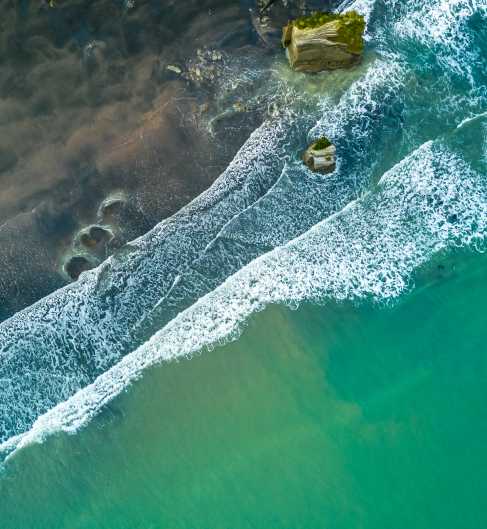
Who we are
Strengthening Research and Innovation
ecosystems to address the impact of climate
change in the Pacific
Project coordinator : Institut de Recherche pour le Développement (IRD), France
Location : Pacific Region
Period : March 2021 – February 2025
Total Budget : 4 944 869 euros
Project priorities
- Access to digital literacy, knowledge and use of emerging technologies.
- Links between R&I skills development and labour market.
- Synergies in the R&I ecosystem (private sector, technology transfer, R&I uptake).
- Local and indigenous knowledge.

Island territories in the Pacific region share similar physiographic characteristics and are similarly exposed to the impacts of climate change, such as rising sea levels, ocean acidification, coastal erosion, temperature increase, and biodiversity loss. Weak research and innovation frameworks and limited capacity to practice science and innovation locally are preventing most Pacific countries from tackling the effects of climate change, and consequently from conserving the environment and developing their societies sustainably.
Civil society organisations (CSOs), enterprises, start-ups, universities, research centres and public authorities will be supported to collaborate in socalled ‘living labs’. This will allow them to share research knowledge and project development/management skills, explore digital tools, and to develop inclusive, smart and sustainable innovative solutions that will enable Pacific countries to adapt to the effects of climate change
Regional public authorities have emphasised the importance of informed and coordinated national and regional responses to tackle the effects of climate change. For sustainable regional development to take place in the Pacific, it is essential to strengthen research and innovation (R&I) capacities and networks among regional and intra-regional actors through inclusive and innovative approaches that address the impacts of climate change on the ocean, and related problems with fisheries, agriculture, water resources and urban
infrastructure. Enhancing the exchange of knowledge and sharing of solutions between public and private stakeholders in the environmental domain is key if we are to increase the countries’ capabilities to face the challenges posed by climate change in the region.
By establishing a regional network that focuses on innovative research in ‘living labs’ and on solutions to mitigate the effects of climate change, all the stakeholders along the innovation value chain will be enabled to co-design the solutions of tomorrow, in particular by taking advantage of the opportunities offered by digital technologies. Involving end-users of R&I solutions (products and services) in the ‘living labs’ will potentially increase the efficiency and effectiveness of R&I activities and ensure the development of solutions that are attuned to local contexts. Furthermore, establishing partnerships along the innovation value chain that transfer and pool skills between universities and companies, particularly small and medium-sized enterprises (SMEs) and start-ups will strengthen the process of coconstructing innovative solutions.
RERIPA is generating and disseminating knowledge to support the development of innovative solutions that mitigate the effects of climate change. It also facilitates collaboration between R&I actors along the innovation value chain by strengthening their capacities in project development/management, research valorisation and in the codesign of solutions.
RERIPA provides financial support to projects from Pacific countries, selected through calls for proposals (see website for details), that operate at regional level around the theme of climate change and:
- Map R&I stakeholders and diagnose the status of R&I in the region.
- Build a multi-stakeholder community that is aware of the importance of science society collaboration in developing useful innovations.
- Design and implement R&I projects in ‘living labs’ that develop innovative solutions to address the most urgent climate change issues.
- Transfer innovative and sustainable solutions to users in the private sector for positive social and economic benefits, and to public authorities for policy making
RERIPA provides training to the R&I actors involved in the ‘living labs’ in:
- Collective R&I intelligence.
- Networking with actors from the public and private sector.
- Project development/management.
- Information technologies.
- Research valorisation (contracting, intellectual property, technology transfer, etc.).
- Financial sustainability
Impacts
An inclusive R&I environment across the Pacific region that is able to deal with the impacts of climate change
Outcomes
- R&I stakeholders across the Pacific region collaborating through a regional network to develop and apply innovative R&I strategies to deal with the impacts of climate change.
- R&I stakeholders able to generate, apply and transfer knowledge to innovate for sustainable development.
- Increased uptake in the region of innovative, inclusive and sustainable solutions to deal with the regional impacts of climate change.
Outputs
- A shared vision on the creation of a regional R&I ecosystem on climate change
- A committed multi-stakeholder community aware of the importance of science-society collaboration in co-designing useful innovations to tackle climate change impacts.
- Skills of actors involved in the ‘living labs’ strengthened in collective intelligence, open innovation and project development/management; development of solutions, tools and services; and transfer of technologies
- ‘Living labs’ established and mobilising actors from research, civil society, industry and public authorities in the development, testing and transfer of innovative and sustainable solutions to tackle the regional impacts of climate change.
Island territories in the Pacific region share similar physiographic characteristics and are similarly exposed to the impacts of climate change, such as rising sea levels, ocean acidification, coastal erosion, temperature increase, and biodiversity loss. Weak research and innovation frameworks and limited capacity to practice science and innovation locally are preventing most Pacific countries from tackling the effects of climate change, and consequently from conserving the environment and developing their societies sustainably.
Civil society organisations (CSOs), enterprises, start-ups, universities, research centres and public authorities will be supported to collaborate in socalled ‘living labs’. This will allow them to share research knowledge and project development/management skills, explore digital tools, and to develop inclusive, smart and sustainable innovative solutions that will enable Pacific countries to adapt to the effects of climate change
Regional public authorities have emphasised the importance of informed and coordinated national and regional responses to tackle the effects of climate change. For sustainable regional development to take place in the Pacific, it is essential to strengthen research and innovation (R&I) capacities and networks among regional and intra-regional actors through inclusive and innovative approaches that address the impacts of climate change on the ocean, and related problems with fisheries, agriculture, water resources and urban
infrastructure. Enhancing the exchange of knowledge and sharing of solutions between public and private stakeholders in the environmental domain is key if we are to increase the countries’ capabilities to face the challenges posed by climate change in the region.
By establishing a regional network that focuses on innovative research in ‘living labs’ and on solutions to mitigate the effects of climate change, all the stakeholders along the innovation value chain will be enabled to co-design the solutions of tomorrow, in particular by taking advantage of the opportunities offered by digital technologies. Involving end-users of R&I solutions (products and services) in the ‘living labs’ will potentially increase the efficiency and effectiveness of R&I activities and ensure the development of solutions that are attuned to local contexts. Furthermore, establishing partnerships along the innovation value chain that transfer and pool skills between universities and companies, particularly small and medium-sized enterprises (SMEs) and start-ups will strengthen the process of coconstructing innovative solutions.
RERIPA is generating and disseminating knowledge to support the development of innovative solutions that mitigate the effects of climate change. It also facilitates collaboration between R&I actors along the innovation value chain by strengthening their capacities in project development/management, research valorisation and in the codesign of solutions.
RERIPA provides financial support to projects from Pacific countries, selected through calls for proposals (see website for details), that operate at regional level around the theme of climate change and:
- Map R&I stakeholders and diagnose the status of R&I in the region.
- Build a multi-stakeholder community that is aware of the importance of science society collaboration in developing useful innovations.
- Design and implement R&I projects in ‘living labs’ that develop innovative solutions to address the most urgent climate change issues.
- Transfer innovative and sustainable solutions to users in the private sector for positive social and economic benefits, and to public authorities for policy making
RERIPA provides training to the R&I actors involved in the ‘living labs’ in:
- Collective R&I intelligence.
- Networking with actors from the public and private sector.
- Project development/management.
- Information technologies.
- Research valorisation (contracting, intellectual property, technology transfer, etc.).
- Financial sustainability
Impacts
An inclusive R&I environment across the Pacific region that is able to deal with the impacts of climate change
Outcomes
- R&I stakeholders across the Pacific region collaborating through a regional network to develop and apply innovative R&I strategies to deal with the impacts of climate change.
- R&I stakeholders able to generate, apply and transfer knowledge to innovate for sustainable development.
- Increased uptake in the region of innovative, inclusive and sustainable solutions to deal with the regional impacts of climate change.
Outputs
- A shared vision on the creation of a regional R&I ecosystem on climate change
- A committed multi-stakeholder community aware of the importance of science-society collaboration in co-designing useful innovations to tackle climate change impacts.
- Skills of actors involved in the ‘living labs’ strengthened in collective intelligence, open innovation and project development/management; development of solutions, tools and services; and transfer of technologies
- ‘Living labs’ established and mobilising actors from research, civil society, industry and public authorities in the development, testing and transfer of innovative and sustainable solutions to tackle the regional impacts of climate change.